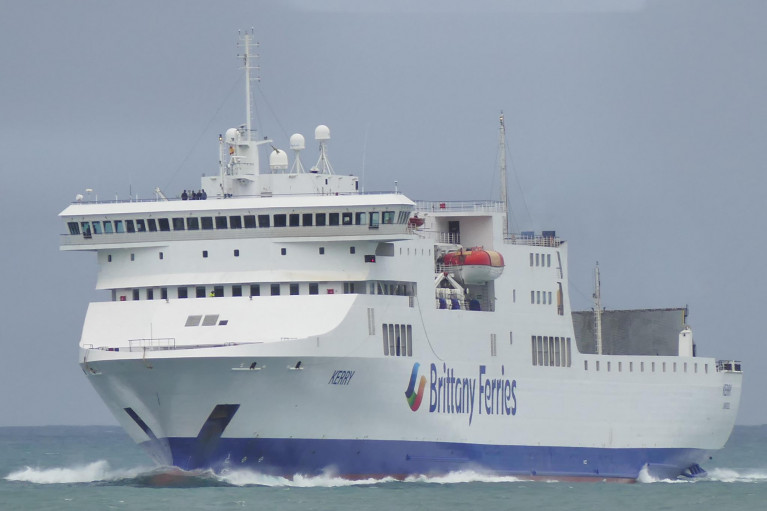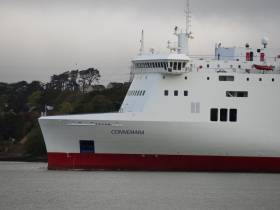Displaying items by tag: New IrelandSpain service
Storm Jorge Forces to Revise Tomorrow's Maiden Sailing Departure On New Ireland-Spain Route
Bad weather has brought forward the departure time of Brittany Ferries maiden commercial crossing tomorrow on the new Rosslare-Bilbao, Spain route, writes Jehan Ashmore.
The looming weather system of Storm Jorge as named by the Spanish met office, has forced in the re-scheduling of the inaugural Brittany Ferries sailing on the new Ireland-Spain service. The launch of the Iberian service will be a first for the French operator to provide a passenger ferry service using Rosslare Europort.
Afloat has consulted the Brittany Ferries website (sailing updates) which cites due to poor weather, (the sailing from Rosslare at 23.30) will now instead depart at the earlier time of 11.00 (tomorrow morning), Friday, 28 February.
An expected arrival into Bilbao is at 08:00 on Saturday, 1 March and the operator added their apologies for the inconvenience caused. For the latest sailing information click here in addition to the operators Reservations Team on (021) 427 7801 (Mon - Fri: 09:00 - 17:30).
The new twice weekly Ireland-Spain route to be operated by ropax Kerry, replaced the Cork-Santander service which ceased recently after a two-year trial period when launched by ropax Connemara. The route received enouraging passengers numbers however Brittany Ferries added the closure arose from freight figures that were not robust and hauliers expressed better road connections and shorter driving distances.
In addition to the relocation of both Irish and Spanish ports, the Kerry will also serve Brittany Ferries which is to launch another new Rosslare to Roscoff route on a weekly return basis starting next month on Monday, 23 March.
This route in addition to Rosslare-Cherbourg was not revived in 2019 as Irish Ferries abandoned these French routes based out of the 'Europort' following the introduction of newbuild W.B. Yeats serving Cherbourg but out of Dublin Port from where the cruiseferry currently operates on the Irish Sea during the winter months to Holyhead. The company however on the St. Georges Channel continue to operate through the Wexford port to Pembroke Dock in Wales.
Likewise of the former Britanny Ferries Cork based route to Spain, Kerry will continue to provide an économie service ship to compliment the weekly seasonal offering from Cork to Roscoff, operated by flagship cruiseferry Pont-Aven.
Afloat this morning tracked Kerry having departed Santander for the final time last night as the ropax makes a repositioning crossing across the Bay of Biscay bound for Rosslare Europort.
The Cypriot flagged ropax is due to arrive in the Co. Wexford ferryport tomorrow morning around 07.30 and remain until the revised morning departure sailing to Spain.
Also tracked by Afloat is Pont-Aven which recently had a new engine installed while in dry-dock at the Remontowa Yard, Gdansk, Poland, following last year's fire on board as previously reported.
The incident caused damage to one of the ferry's port-side MAK 12VM43 engine units resulting in the cruiseferry running on the three remaining engines during 2019 which caused disruption and cancelled sailings. Also berthed nearby at the Polish shipyard is Irish Ferries cruiseferry Ulysses. Afloat will have more to report.
As for the resumption of Brittany Ferries Cork-Roscoff seasonal service, this is scheduled to start with the first inward sailing from France departing on Friday, 20 March. The corresponding outward sailing from Ringaskiddy in lower Cork Harbour is to take place the next day, Saturday, 21 March.
Europe Day: Sees Start of Historic New First Ever Direct Ireland-Spain Ferry Route Service
#FerryNews - Europe Day aptly coincided with Brittany Ferries albeit delayed start of the first ever direct Ireland-Spain ferry service when Connemara departed Cork at lunchhour today bound for Santander, writes Jehan Ashmore.
Almost berthed adjacently to Ringaskiddy Ferry Terminal where ropax Connemara welcomed passengers and loaded vehicles for today's historic maiden voyage to Spain, was docked Portuguese flagged cruiseship Astoria. The veteran vessel had arrived earlier this morning.
As for the ferry, Connemara had also arrived this morning from France (see below) before launching the new historic continental route directly connecting Ireland and Spain for the first time. A scheduled departure at 11.00 did not take place however the ropax finally was underway two hours later. Connemara then past Roches Point Lighthouse at the mouth of Cork Harbour and out into the open sea.
Connemara, formerly Asterion is on a two-year charter to Brittany Ferries which are to operate the 2007 Italian built Cypriot flagged ropax across the Bay of Biscay service on a trial basis. The 500 passenger /120 cabin ferry is modelled on a économie 'no-frills' service that is scheduled to run two return sailings weekly between Cork and northern Spain.
Crossing times on the 27,000 gross tonnage Connemara connecting Cork and the Cantrabrian port is around 26 hours. Facilites available of the no-frills operated ferry include a self-service restaurant, café/bar, small shop / boutique and seating lounge. In addition to en-suite cabins for passengers that are exclusively motorist-based. The ropax can handle a mix of around 100-freight trailers units and between 80 and 100 tourist vehicles.
Traveling direct to Spain now offers exciting benefits for Irish tourists to explore the lesser known regions of northern Spain compared to air-dependent destinations to the countries Costa's lining the Meditteranean. It is from these well-trodden resorts where around 2 million Irish holiday-makers annually visit the coast but rarely travel to the interior. Now there's northern Spain, where Santander itself is a culinary destination, Bilbao beckons (for Leinster rugby fans on board) as does the Basque Country and regions heading west to Galicia neighbouring Portugal.
The new Irish-continental link will further forge in strengthening travel and cultural ties with Spain but throughout the Iberian peninsula. In addition to assisting existing and developing new freight trade opportunities.
According to the Port of Cork, which has been trying to open an Ireland-Spain link since 2004, the service will remove 1,200kms off road journey distances for many hauliers currently opting for a land-bridge via the UK. The new Spanish service is a also a game-changer given a post-Brexit UK and its relationship between Ireland and with the rest of the EU.
Prior to today's historic maiden voyage on the Ireland-Spain route, Connemara's debut for Brittany Ferries was completed following a sailing to France yesterday. This morning, Connemara returned to Ringaskiddy to complete the round trip. Due to operational reasons, the 186m Connemara docked in Brest rather than the routine port of call at Roscoff.
The Ireland-France route which this year celebrates a 40th anniversary, is served by flagship cruiseferry Pont-Aven at the weekends. Introduction also of Connemara during the week boosts capacity and likewise of the Spanish service is based on an économie no-frills service, except foot-passengers are catered for on the 14 hour Iink to Roscoff.































































